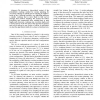Free Online Productivity Tools
i2Speak
i2Symbol
i2OCR
iTex2Img
iWeb2Print
iWeb2Shot
i2Type
iPdf2Split
iPdf2Merge
i2Bopomofo
i2Arabic
i2Style
i2Image
i2PDF
iLatex2Rtf
Sci2ools
105
click to vote
ICRA
2003
IEEE
2003
IEEE
HPRM: a hierarchical PRM
— We introduce a hierarchical variant of the probabilistic roadmap method for motion planning. By recursively refining an initially sparse sampling in neighborhoods of the C-obstacle boundary, our algorithm generates a smaller roadmap that is more likely to find narrow passages than uniform sampling. We analyze the failure probability and computation time, relating them to path length, path clearance, roadmap size, recursion depth, and a local property of the free space. The approach is general, and can be tailored to any variety of robots. In particular, we describe algorithmic details for a planar articulated arm.
| Added | 04 Jul 2010 |
| Updated | 04 Jul 2010 |
| Type | Conference |
| Year | 2003 |
| Where | ICRA |
| Authors | Anne D. Collins, Pankaj K. Agarwal, John Harer |
Comments (0)

